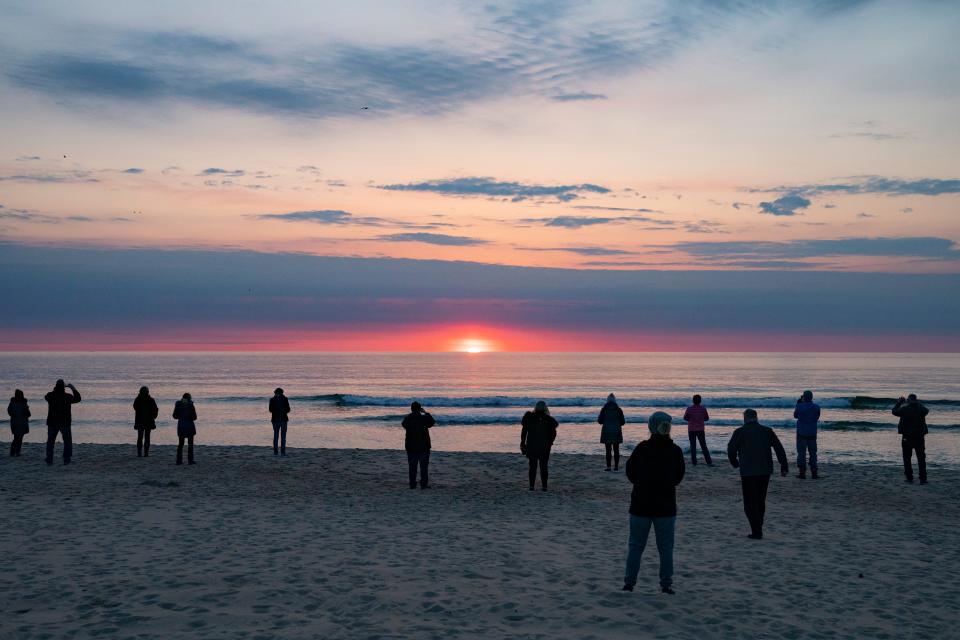Harvard's atheist chaplain: It's another sign of America's growing secularism
It is a sign of the times: Harvard University appointed an atheist as its chief chaplain.
To many it was a jarring announcement, or perhaps a story in The Onion. To others, it was yet another example of the Ivy League being out of touch with “real” Americans. However, an atheist chaplain is more in tune with current trends than one might think.
Our research finds that a large and growing number of Americans are “religious secularists.”
For religious secularists, religious and secular views are far from a binary choice. Instead, they have a worldview that combines both religious and secular perspectives —a reality that can be just as jarring as an atheist chaplain.
Many observers have missed this fusion because they assume that secularism is merely the absence of religion. To the contrary, just as someone can simultaneously hold liberal views on some issues and conservative views on others, many people mix and match elements of religiosity and secularity.
USA TODAY's opinion newsletter: Get the best insights and analysis delivered to your inbox.
Take, for example, the well-documented rise of the “nones” — people who report no religious affiliation. A generation ago, the nones were such a small group that they were safely ignored, but now roughly one in four Americans count as nones.
However, this growth in non-religiosity is the small tip of a much larger iceberg. America’s growing secular population is far more complex than suggested by merely tracing the growing ranks of nones.
More: America's COVID response is still badly flawed. Here's how to finally get it right.
The nones are defined by what they are not, namely religious. In contrast, true secularists are defined by what they are: believers in secular, humanist and rationalist principles.
To be sure, many secularists have no religion in their lives — think the quintessential atheist who roundly rejects religion in every way, shape and form. Yet, religious secularists identify with a faith community, attend worship services and seek guidance from religious sources.

While some, like Harvard’s new chaplain, are atheists, many more are simply ambivalent about the existence of God and other supernatural matters. Most are comfortable combining the spiritual and the scientific; others follow in a long line of pragmatic Americans who practice faith informed by reason, while relying on reason enriched by faith.
To quote Tennyson, “There lives more faith in honest doubt, believe me, than in half the creeds.”
Who are the religious secularists? Many are Jews, mainline Protestants and Catholics. Fewer are white evangelical Protestants, Black Protestants or Mormons, but even in these more traditionalist faiths, religious secularists are more common than one might expect.
Number of secularists likely to grow
We find that the religious secularists make up about one-sixth of the American public. To put this figure in perspective, that is twice the number of Southern Baptists. Given that America — historically and still a highly religious nation — is experiencing a secular surge, it seems likely that the ranks of religious secularists will grow.
Religious secularists could be a politically potent group. Like other secularists, they are highly engaged in politics — they vote, work on campaigns and otherwise make their voices heard in the political arena.
CONNIE SCHULTZ: Read more of her columns
But their civic activity, such as volunteering in the community and giving to charity, looks more like that of their fellow religionists, long regarded as exemplars of civic engagement.
Religious secularists lean left politically but are better described as moderates than progressives. Many are Democrats, but they are more likely to be found in the Joe Biden/Pete Buttigieg wing of the party than among the backers of Bernie Sanders or Elizabeth Warren. As moderates, they are open to persuasion by Republican candidates.
Secularists could have political power
Like independent voters, religious secularists could become a swing constituency. A smart politician of either party would recognize the potential in appealing to voters for whom both religious and secular messages resonate, especially in diverse districts and competitive states.
For example, religious secularists take a middle path on the fraught debate over the role of religion in American society. They are against anything that smacks of government establishment of religion, while nonetheless favoring the free exercise of religion (with appropriate respect for the rights of others, particularly the LGBTQ community).
But the larger significance of religious secularists lies in what they portend for the future of American public life. They are like the proverbial “missing link,” revealing that religious and secular Americans are not two separate species, but instead twin branches of the same family tree.
Many old conflicts among American religionists — think of Catholics versus Protestants— disappeared as members of different traditions realized that they had much in common. The religious secularists suggest that perhaps the same could be true for religious Americans and their secular counterparts.
An atheist chaplain at Harvard?
It is a sign of the times, indeed.
David Campbell and Geoffrey Layman are professors at the University of Notre Dame; John Green is an emeritus professor at the University of Akron. They are the authors of "Secular Surge: A New Fault Line in American Politics."
You can read diverse opinions from our Board of Contributors and other writers on the Opinion front page, on Twitter @usatodayopinion and in our daily Opinion newsletter. To respond to a column, submit a comment to letters@usatoday.com.
This article originally appeared on USA TODAY: Religious secularism: What the trend means for American society

 Yahoo Movies
Yahoo Movies 